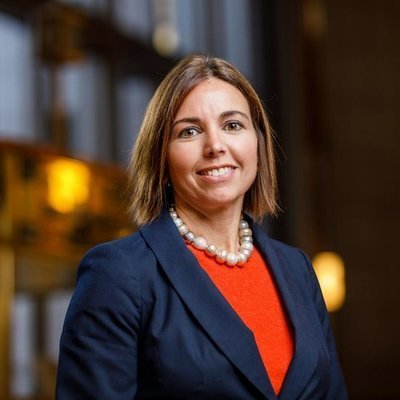As jobs losses cascaded across the economy this spring due to the coronavirus pandemic, so, too, did summer internships evaporate amid the disruption.
For University of Notre Dame students planning to work in the finance industry, losing out on an internship means not only the loss of job experience and money. It also means losing an opportunity to figure out where they want to take their careers.

“The post-sophomore year internship or externship is really critical, because a lot of career discernment goes on then,” said Erin Bellissimo, managing director of the Notre Dame Institute for Global Investing (NDIGI). “They get exposure to the investment industry, and they can actually see what the job is all about.”
NDIGI, located in the Mendoza College of Business, supports investment management research; provides experiential learning opportunities; convenes workshops, conferences and guest speakers; and coordinates internship and career placement opportunities for Notre Dame students interested in investment management.
As the pandemic began taking its toll on the finance sector in early spring, Bellissimo and NDIGI associate director Mark Dumich quickly realized that not only would students suffer, but also companies — especially smaller institutions without sizable HR departments — that relied on the interns for research work.
“The statement we heard a lot was that students would get a pass for missing an internship this year, because everyone knows it’s due to COVID,” said Bellissimo. “Our view was, no, let’s make Notre Dame students stand out. Let’s really work hard so that they can say, ‘Actually, I did this very unique program and still got industry experience.’”
The result was two programs designed by the NDIGI team to provide students with an online summer learning experience while also strengthening the recruiting partnerships with investment firms.
The Virtual Internship Program (VIP) and the Virtual Investing Bootcamp Experience (VIBE) both provide students with the opportunity to participate in Wall Street Prep, a rigorous online program often used in corporate finance and investment banking to train new employees how to build financial models.
VIP also requires a capstone project provided by an industry partner where students apply their knowledge to real-world investment opportunities. Students are expected to work 10 to 12 hours per week over four weeks on the project, which could range from preparing an investment thesis to researching the economic impact of COVID-19 on businesses.
VIP and VIBE, which take place June 15 to July 31, offer different tracks with either introductory or advanced levels of content so that business majors and non-business majors can participate.
“The sessions are all designed to be very interactive,” said Bellissimo. “Students take assessment tests, and we can track how many hours a student is spending with the program. Each module teaches them a concept like how to do a valuation, then requires the student to actually do one. So they gain a lot of hands-on experience in critical areas that they will use in their careers.”
The students also will hear via live Zoom sessions from industry experts and Notre Dame faculty experts on a host of topics, including the economic impact of COVID-19, how to pitch an investment and the investing outlook from specific sectors such as consumer goods. At the end of the program, the students also give a final presentation to the company to gain feedback.
As of early May, the applications for VIBE were about 145 and 130 for VIP. The applicants included Notre Dame students from the colleges of Arts & Letters, Science and Engineering, as well as from Mendoza. Most were rising sophomores and juniors, with several dozen rising seniors and a handful of MBA students.
“Creative thinkers are what the investment industry wants, not just technical finance majors,” said Bellissimo. “Especially given NDIGI’s initiative around diversity and inclusion, it was important for us to open these opportunities to everyone, whether that means women or non-business majors.”
“Getting into the investment industry can be a little intimidating if you’re not a finance student,” said Dumich. “VIBE is a very low-risk way for a student who might be interested in testing the waters. We wanted to demystify Wall Street a little bit and make it more accessible to students that aren’t of the traditional background.”
NDIGI intended to offer VIP and VIBE as interim solutions to the missing internships, but the student demand has the team reconsidering whether the programs may continue even when some normalcy is restored.
“By marrying our industry speakers and our terrific network with these online courses and content, and adding an industry project, we think the programs are a great compromise for the traditional internship,” said Bellissimo. “Even during a pandemic, we want to deliver on our promise of providing our students with outstanding opportunities.”